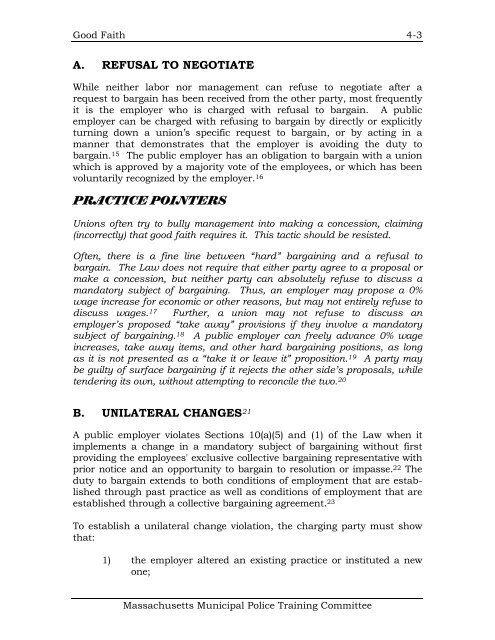Management Rights - AELE's Home Page
Management Rights - AELE's Home Page
Management Rights - AELE's Home Page
You also want an ePaper? Increase the reach of your titles
YUMPU automatically turns print PDFs into web optimized ePapers that Google loves.
Good Faith 4-3<br />
A. REFUSAL TO NEGOTIATE<br />
While neither labor nor management can refuse to negotiate after a<br />
request to bargain has been received from the other party, most frequently<br />
it is the employer who is charged with refusal to bargain. A public<br />
employer can be charged with refusing to bargain by directly or explicitly<br />
turning down a union’s specific request to bargain, or by acting in a<br />
manner that demonstrates that the employer is avoiding the duty to<br />
bargain. 15 The public employer has an obligation to bargain with a union<br />
which is approved by a majority vote of the employees, or which has been<br />
voluntarily recognized by the employer. 16<br />
PRACTICE POINTERS<br />
Unions often try to bully management into making a concession, claiming<br />
(incorrectly) that good faith requires it. This tactic should be resisted.<br />
Often, there is a fine line between “hard” bargaining and a refusal to<br />
bargain. The Law does not require that either party agree to a proposal or<br />
make a concession, but neither party can absolutely refuse to discuss a<br />
mandatory subject of bargaining. Thus, an employer may propose a 0%<br />
wage increase for economic or other reasons, but may not entirely refuse to<br />
discuss wages. 17 Further, a union may not refuse to discuss an<br />
employer’s proposed “take away” provisions if they involve a mandatory<br />
subject of bargaining. 18 A public employer can freely advance 0% wage<br />
increases, take away items, and other hard bargaining positions, as long<br />
as it is not presented as a “take it or leave it” proposition. 19 A party may<br />
be guilty of surface bargaining if it rejects the other side’s proposals, while<br />
tendering its own, without attempting to reconcile the two. 20<br />
B. UNILATERAL CHANGES 21<br />
A public employer violates Sections 10(a)(5) and (1) of the Law when it<br />
implements a change in a mandatory subject of bargaining without first<br />
providing the employees' exclusive collective bargaining representative with<br />
prior notice and an opportunity to bargain to resolution or impasse. 22 The<br />
duty to bargain extends to both conditions of employment that are established<br />
through past practice as well as conditions of employment that are<br />
established through a collective bargaining agreement. 23<br />
To establish a unilateral change violation, the charging party must show<br />
that:<br />
1) the employer altered an existing practice or instituted a new<br />
one;<br />
Massachusetts Municipal Police Training Committee
















